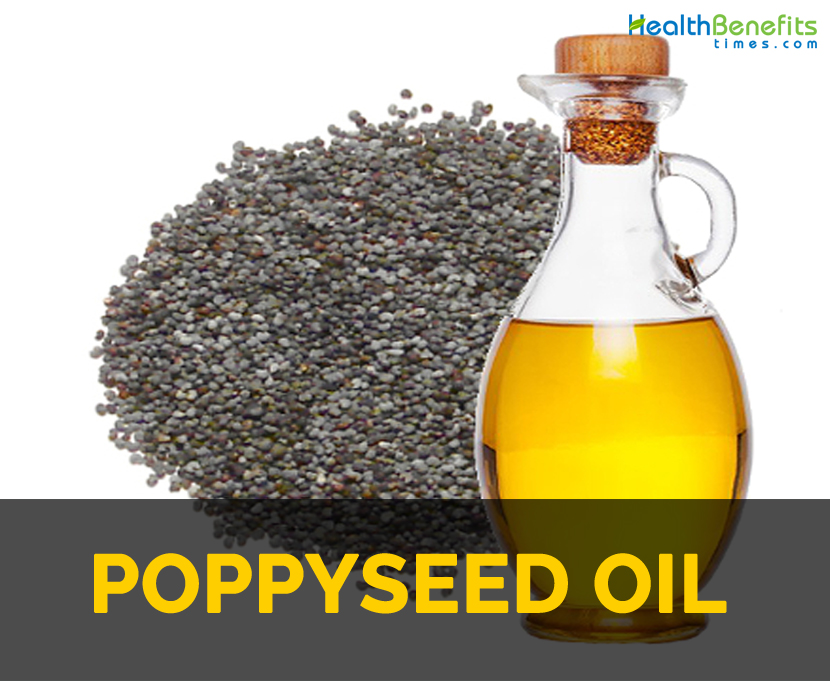| Poppyseed oil facts and benefits Quick Facts | |
|---|---|
| Name: | Poppyseed oil facts and benefits |
| Origin | Poppy seed was cultivated widely in Eurasia. The world's production for poppyseed oil occurs in Germany and France. |
| Colors | Light yellow |
| Taste | Sweet, nutty, pleasant |
| Calories | 1927 Kcal./cup |
| Major nutrients | Total Fat (6.228571429) |
Poppyseed oil is edible oil which is derived from the poppy seeds. The poppy seeds contain 45 to 50% of oil which is rich in Vitamin E, codeine and morphine. It is used for both pharmaceutical and culinary uses as well as making varnishes, paints and soaps. In industrialized countries, it is used for culinary purposes as dipping oil and in salads. It is also known as Poppy seed oil, oleum papaveris seminis and poppy oil.
Nutritional value
One cup of 218 grams of Poppyseed oil is comprised of 1927 calories and 218 g of total lipid fat. It also offers 24.85 mg of Vitamin E, 29.43 g of total saturated fat, 23.108 g of palmitic acid, 6.322 g of stearic acid, 42.946 g of total monounsaturated fat, 42.946 g of oleic acid, 136.032 g of total polyunsaturated fats, 136.032 g of linoleic acid and 602 mg of phytosterols in the same serving size.
Health Benefits of Poppyseed oil
Poppyseed have high concentration of minerals, vitamins, dietary fibers and electrolytes that assist human body as well as circulatory system. It also possesses anti-inflammatory and antioxidant properties that help to promote immunity as well as cell damage. In the 19th century, this oil was used for various purposes such as cooking oil, fuel or lamp oil, varnish and making paint and soaps.
- It is used as massage oil.
- The intake of teaspoon of poppy seed oil before bed helps to treat sleeplessness.
- Poppy seeds provide relief from asthma and symptoms of whooping cough.
- It is also used to treat stomach problems such as diarrhea.
- It prevents the growth of tumor.
Precautions
- People allergic to Poppy seeds should not use it.
- Consult a doctor before using.
- People with cholesterol lowering drugs, nervous system depressants, suppress immune system, pain relievers and opiates should use it with caution.
How to Eat
- It is used to add flavor to rolls, breads and cakes.
- It is used in salads and as dipping oil.
- It is used to noodles, pastries and breads.
- It is used as a condiment in various dishes.
Other Facts
- Poppyseed oil in raw form has high concentration of essential fatty acids.
- It is also rich in oleic acid and linoleic acid.
- It does not have narcotic properties.
Poppyseed oil facts
Poppy seed oil has pleasant and nutty flavor. The plant of poppy was originated from East Mediterranean and Asia belonging to the Papaver genus having its scientific name as Papaver somniferum. The oil is extracted from the small and dark seeds of the poppy flower which is mostly used for dressing salads. Due to the smooth and subtle flavors, it is used as a condiment. It is an excellent source of energy, calcium and calcium. It also have highest amount of linoleic acid that helps to prevent from heart attacks and heart diseases. It has unique aroma and flavor. The study shows that this oil is used for fertility as well.
| Name | Poppyseed oil facts and benefits |
|---|---|
| Native | Poppy seed was cultivated widely in Eurasia. The world’s production for poppyseed oil occurs in Germany and France. |
| Common/English Name | Poppy seed oil, oleum papaveris seminis, poppy oil |
| Color | Light yellow |
| Flavor/aroma | Smooth, subtle |
| Taste | Sweet, nutty, pleasant |
| Major Nutritions | Total Fat (lipid) 218 g (6.228571429) |
| Calories in 1 cup (218 gm) | 1927 Kcal. |
| Traditional uses |
|
| Precautions |
|
| How to Eat |
|
| Other Facts |
|
References:
http://healthybenefits.info/the-health-benefits-of-poppyseed-oil/
https://cals.arizona.edu/fps/sites/cals.arizona.edu.fps/files/cotw/Poppy.pdf
http://www.rejuvenative.com/products/Poppy-Seed-Oil.htm
Comments
comments
